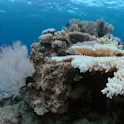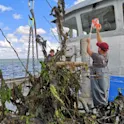
Environment
05 Oct 2023
Can masculine marketing convince more men to eat vegan?
by Angharad Brewer Gillham, Frontiers science writer Image/Shutterstock.com Eating more plant-based dishes is good for your health and good for the planet – but the perception that these dishes are for women and not for men may be stopping some men from choosing plant-based meals. Scientists found that you can present vegan dishes with a masculine framing, altering the perception that these dishes are for women, but changing the perception doesn’t change people’s preferences. Eating more plant-based meals is better for our health and better for the planet. But cultural preferences are significant barriers to reducing meat consumption – especially for men, who are underrepresented among vegans and vegetarians. Studies have found that eating meat is associated with masculinity, and that gender stereotypes label plant-based diets as suitable for women but not men. So is it possible to change the perception of plant-based food with marketing, and convince men to eat more of it? “Men might be less inclined to consume vegan food due to the need to perform gender,” said Alma Scholz, lead author of a new study published in Frontiers in Communication. “However, with vegan food being framed in a masculine way, men might feel less resistance and […]













